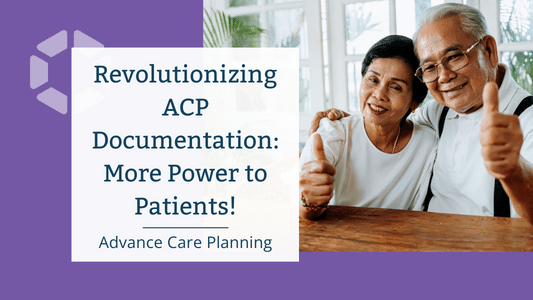
Part Four of Our Six-part Series: Confronting Advance Care Planning Misconceptions
Welcome back to our incisive blog series on Advance Care Planning (ACP) controversies. Our previous discussion – Revolutionizing Advance Care Planning Documentation: Power to Patients! – delved into the complexities of ACP documentation that obstruct seamless communication and decision-making in ACP. Today, we are going to focus on actionable recommendations that can ensure timely access to patients’ plans in an emergency.
It's high time we faced the hard truth about advance care planning and portable medical order (PMO) forms. In emergency situations, when critical decisions about treatment and care should be informed by these documents, they are often nowhere to be found. The reality? Accessibility is a matter of life and death. This post takes an unflinching look at the current state of ACP document and PMO forms accessibility and proposes concrete strategies for change, grounded in cutting-edge data and informed by practical experience.
The troubling tale of absent ACP documents and portable medical orders.
Time and again, it's the same story: ACP documents and PMO forms, that have been painstakingly discussed and documented on paper, end up forgotten at home, stowed away in safe deposit boxes, or filed away in legal offices – far from where they need to be in a medical crisis. Despite our best efforts, healthcare providers, community partners, and digital ACP providers are falling short when it comes to ensuring these crucial documents are readily available when decisions need to be made.
Recent data underscore the impact of this recurring issue. In a study of 6,072 patients presenting with an acute medical emergency, a mere 4.8% had an ACP available for the admitting medical team. This concerning trend extends even to those with advanced age and recent hospital admissions, where the availability of ACPs remains frustratingly low, despite national guidance pushing for their prevalence. Even among patients over 80 years of age, the prevalence was only 9.5% (95% CI 9.1–10.0%). Clearly, there’s a dire need to implement proven methods to bring patients’ wishes to the forefront of acute medical care.
The pitfalls of paper: inaccessible advance directive information.
Today's largely paper-based approach to ACP leads to a litany of problems – redundant form creation, increased administrative burden, and perhaps most importantly, compromised patient satisfaction when treatments aren’t informed by personal values, goals, and preferences regarding emergency treatment and end-of-life care decisions. While some electronic health record (EHR) systems are capable of recording notes from ACP conversations, many are not. Further, the lack of interoperability and access to these vital documents in emergencies presents a significant barrier for practitioners and the patients, residents, and members they serve.
The path to change ACP accessibility through interoperability.
Industry leaders are championing the Advance Directive Interoperability (ADI) with Fast Healthcare Interoperability Resource (FHIR) implementation guides (IG), a project aimed at advancing interoperable data standards for the exchange, integration, sharing, and retrieval of ACP information. The ADI with FHIR project addresses key aspects of how to represent, exchange, and verify a person’s goals, preferences, and priorities for medical treatment and interventions regarding future medical care as individuals move through the healthcare continuum.
The FHIR IG encompasses RESTful API interactions for querying, retrieving, and verifying advance directive information between systems, opening up accessibility to crucial components such as living wills, durable medical power of attorney, personal health goals at end of life, care experience preferences, patient instructions, and portable medical orders for life-sustaining treatments.
From siloed to seamless: ADVault’s solution for ACP accessibility.
At ADVault, we are revolutionizing the storage and accessibility of ACP documents and PMO forms. Our HITRUST r2-certified electronic database, the ADVault Exchange™, allows for the storage and retrieval of advance directive information anytime, anywhere. With the integration of MyDirectives Solutions tools powered by ADVault into your workflow, you can directly query and retrieve advance directive information.
The ADVault Exchange is a proprietary registry and repository of person-generated health data (PGHD) for the collection and retrieval of ACP documents and PMO forms. It offers seamless interoperability into leading electronic database platforms for hospitals, healthcare payers, and medical practices, including Electronic Health Records (EHR), Electronic Medical Records (EMR), Patient Health Records (PHR), Patient Portals, and Health Information Exchanges (HIEs).
Building a better future: benefits of best-in-breed ACP technology solutions.
Transitioning from an antiquated paper-based ACP program to an innovative, tech-driven approach offers a host of benefits. It significantly reduces clinician burnout and family burdens by eliminating the time spent and the frustration of locating ACP documents and PMO forms during critical moments. More importantly, accessibility clarifies patient wishes, improves communication between acute and post-acute care providers during critical patient transitions, and fosters interoperability.
The world of ACP document and PMO form accessibility is at a crossroads. It's time to leverage the power of technology and push for interoperability to ensure patient wishes are at the heart of all medical decisions. At ADVault, we're at the forefront of this important journey. We invite you to join us.
Don't miss out on our upcoming installation on Crack the Code: Mastering ACP Regulations! If you haven’t already, subscribe to our blog and be the first to delve into our insights on ACP compliance requirements.
Let’s get started on digital ACP together
Secure, Interoperable, Accessible.
MyDirectives offers the only digital advance care planning (ACP) tools and interoperable cloud-based storage that is HITRUST Risk-Based 2-year Certified.






